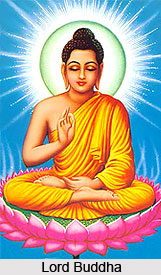 Whatever is impermanent is subject to change. Whatever is subject to change is subject to suffering. - The Buddha
Whatever is impermanent is subject to change. Whatever is subject to change is subject to suffering. - The Buddha
Dukkha (Pali Sanskrit) when translated in English stands for `suffering` but its philosophical meaning is more complex. Suffering is not a satisfactory equivalent English word for Dukkha, too narrow a translation and therefore it is best to leave dukkha un-translated. It is the opposite of Sukha, which stands for ease, well-being.
This concept of dukkha is a key concept in Buddhism and roughly corresponding to a number of terms in English. These are sorrow, suffering (or pain), affliction, anxiety, dissatisfaction, discomfort, anguish, stress, misery, aversion and frustration. Although it roughly depicts a pessimistic picture yet Buddhism has nothing to do with pessimism or optimism. Dukkha is the focus of the Four Noble Truths which states its nature, its cause its elimination and way that leads to its elimination. The way to its elimination is the Noble Eight fold Path .The Four Noble Truths are one of the most fundamental Buddhist teachings. They appear many times throughout the most ancient Buddhist texts. Buddha discussed three kinds of dukkha.
Striving for what one desires, one might experience stress and suffering - dukkha (Pli; Sanskrit: dukkha). By obtaining what one desires, one may be delighted and happy. Soon after, the freshness may fall apart and one stands a chance to be bored with it. Boredom is a form of dissatisfaction (or suffering) and in order to escape from it, one diverts oneself from such boredom by indulging in a pursuit of new kinds of pleasure. Sometimes not willing to let go of the objects that one is already uninterested in, one starts to collect and gather possessions instead of sharing with others, who may have better uses for them than one does. Boredom is a outcome of change: the change of one`s interest in that object of desire which so captivated him/her in the beginning.
Dukkha-dukkha (pain of pain) is the obvious sufferings of physical pain, illness, old age, death, the loss of a loved one. Viparinama-dukkha (pain of alteration) is suffering caused by change-violated expectations, the failure of happy moments to last. Sankhara-dukkha (pain of formation) is a subtle form of suffering inherent in the nature of conditioned things, including the skandhas and the factors constituting the human mind.
If one does not get bored already, then change may instead occur in the object of desire. Silverware may become tarnished, a new dress can become worned and flimsier, or a gadget cn go obsolete. Or it may just break down, causing one to grieve. In some cases it may get lost or stolen. In certain instances, one can vex oneself about such losses even before they occur. Sadly, sometimes one`s very worry and fear drives one to act illogically, resulting in mistrust and breaking up of the very relationship that one cherished so much.
While one admires changes, like becoming an adult when one is in his/her teens. However, one dislikes the change called aging. While one strives for change to become rich, one fears the change of economising. One is always selective in one`s attitude towards the ephemeral nature of one`s very existence. Sadly, this ephemeral nature is unselective. One can try to fight it, just as many have tried since time immemorial, only to have one`s efforts washed out through the passage of time. As a result, one continually experiences dissatisfaction or suffering due to the very impermanence of `compounded phenomena`.
Only in the domain of Nirvana - so Buddhism insists - can true and persistent happiness be found. Nirvana is the opposite of the conditional, the transitory and the painful (dukkha), therefore it does not result in disappointment or worsening of the state of bliss. Nirvana is the recourse from the otherwise universal monocracy of change and suffering. In other schools of Buddhism, nirvana is not viewed as the destination, but simply as a projection from the state of samsara. According to these schools, samsara (daily routine) and nirvana (perfection) are two sides of the same coin that must be transcended through assiduous practice of meditation.
The exercise of vipassana (Buddhist meditation) brings about a satisfaction in experience. It assumes that the meditator sees the instances of happiness clearly. However it is denied that such happiness will be secure and lasting. Gautam Buddha insisted that the truths about dukkha are important as far as attaining the ultimate goal of nirvana is concerned.




















